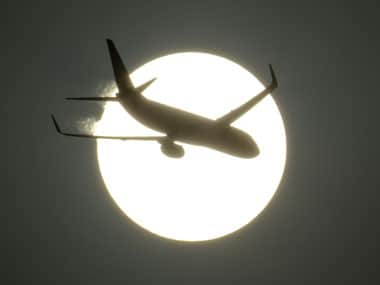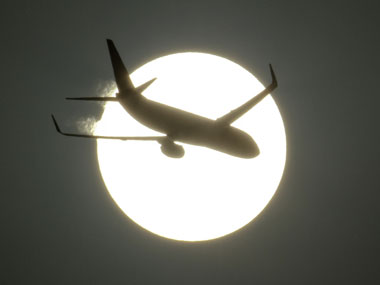New Delhi: India’s airlines are being gently nudged to desist from “predatory” pricing as the Ministry of Civil Aviation prepares to launch some sort of mechanism to regulate air fares. Sources in the ministry told CNBC-TV18 that the airline CEOs have been told “gently” that air fares should not be exorbitant as the ministry wants airlines to self regulate instead of imposing a regulation mechanism on them. These sources said though there is no stated definition of what constitutes exorbitant fares, indications have been given to airlines’ top brass that maximum fare on a sector should not exceed 2.5-3 times the average fare. As of now, last minute fares can sometimes be over 10 times the lowest average.[caption id=“attachment_2197000” align=“alignleft” width=“380”]
 Representational image. Reuters[/caption] Sounds good but how will airlines implement these “gentle” dictats? Minister of State for Civil Aviation Mahesh Sharma has, many times in the past, spoken of fare regulation and indicated that DGCA may be asked to devise a mechanism for regulating air fares.This is where airlines have a valid objection - they point out that DGCA is a safety regulator and may not be qualified to regulate fares. Besides, changes will have to be made to the Aircraft Act 1937 before any fare regulation can happen. Air fare regulation sounds good if one is a votary of mindless populism, since world over market forces are allowed to prevail. Earlier, a parliamentary panel had come up with a bizarre suggestion: that two-three seats in every aircraft be kept vacant for last-minute emergencies and be sold at reasonable fares. This again is a rather impractical suggestion - if there are five claimants for three such seats, who should be prioritized and on what basis? Besides, why should airlines sacrifice their profits when anyway most tickets are subsidized by them to get more people to fly? An unintended fallout of any fare regulation could be a general increase in fares, even as the lower levels. From what sources have been saying, it is obvious that till the ministry navigates the minefield of fare regulation, it has taken to issuing verbal warnings to airlines, cautioning them to stay in line. It must be mentioned here that the DGCA recently exonerated airlines from the charge that they have been fleecing flyers. The safety regulator conducted this fare analysis in 18 sectors and noted that average fares were close to minimum fares being offered by airlines, indicating that most tickets sold by domestic carriers were not in the highest fare bucket. Earlier, the ministry was debating a mechanism where it proposed maximum fare to any destination for economy class at Rs 20,000. The minimum fare was to depend on the breakeven cost of each airline. Meanwhile, the ministry sources quoted earlier also said Civil aviation Minister A Gajapathi Raju will soon be writing to about 100 MPs on air fares. He is expected to convey that high fares, about which many MPs had complained, form just 2-3 percent of all tickets sold. He is expected to quote this DGCA study to convince MPs that majority of flyers are not being fleeced. Scores of MPs have been writing to Raju, complaining against exorbitant last minute fares - this specially holds true for routes which connect the north-east regions of India.
Representational image. Reuters[/caption] Sounds good but how will airlines implement these “gentle” dictats? Minister of State for Civil Aviation Mahesh Sharma has, many times in the past, spoken of fare regulation and indicated that DGCA may be asked to devise a mechanism for regulating air fares.This is where airlines have a valid objection - they point out that DGCA is a safety regulator and may not be qualified to regulate fares. Besides, changes will have to be made to the Aircraft Act 1937 before any fare regulation can happen. Air fare regulation sounds good if one is a votary of mindless populism, since world over market forces are allowed to prevail. Earlier, a parliamentary panel had come up with a bizarre suggestion: that two-three seats in every aircraft be kept vacant for last-minute emergencies and be sold at reasonable fares. This again is a rather impractical suggestion - if there are five claimants for three such seats, who should be prioritized and on what basis? Besides, why should airlines sacrifice their profits when anyway most tickets are subsidized by them to get more people to fly? An unintended fallout of any fare regulation could be a general increase in fares, even as the lower levels. From what sources have been saying, it is obvious that till the ministry navigates the minefield of fare regulation, it has taken to issuing verbal warnings to airlines, cautioning them to stay in line. It must be mentioned here that the DGCA recently exonerated airlines from the charge that they have been fleecing flyers. The safety regulator conducted this fare analysis in 18 sectors and noted that average fares were close to minimum fares being offered by airlines, indicating that most tickets sold by domestic carriers were not in the highest fare bucket. Earlier, the ministry was debating a mechanism where it proposed maximum fare to any destination for economy class at Rs 20,000. The minimum fare was to depend on the breakeven cost of each airline. Meanwhile, the ministry sources quoted earlier also said Civil aviation Minister A Gajapathi Raju will soon be writing to about 100 MPs on air fares. He is expected to convey that high fares, about which many MPs had complained, form just 2-3 percent of all tickets sold. He is expected to quote this DGCA study to convince MPs that majority of flyers are not being fleeced. Scores of MPs have been writing to Raju, complaining against exorbitant last minute fares - this specially holds true for routes which connect the north-east regions of India.
Keep maximum fares 2.5-3 times average: Aviation ministry nudges airlines
Sindhu Bhattacharya
• July 13, 2015, 15:15:29 IST
Air fare regulation sounds good if one is a votary of mindless populism, since world over market forces are allowed to prevail.
Advertisement
)
End of Article